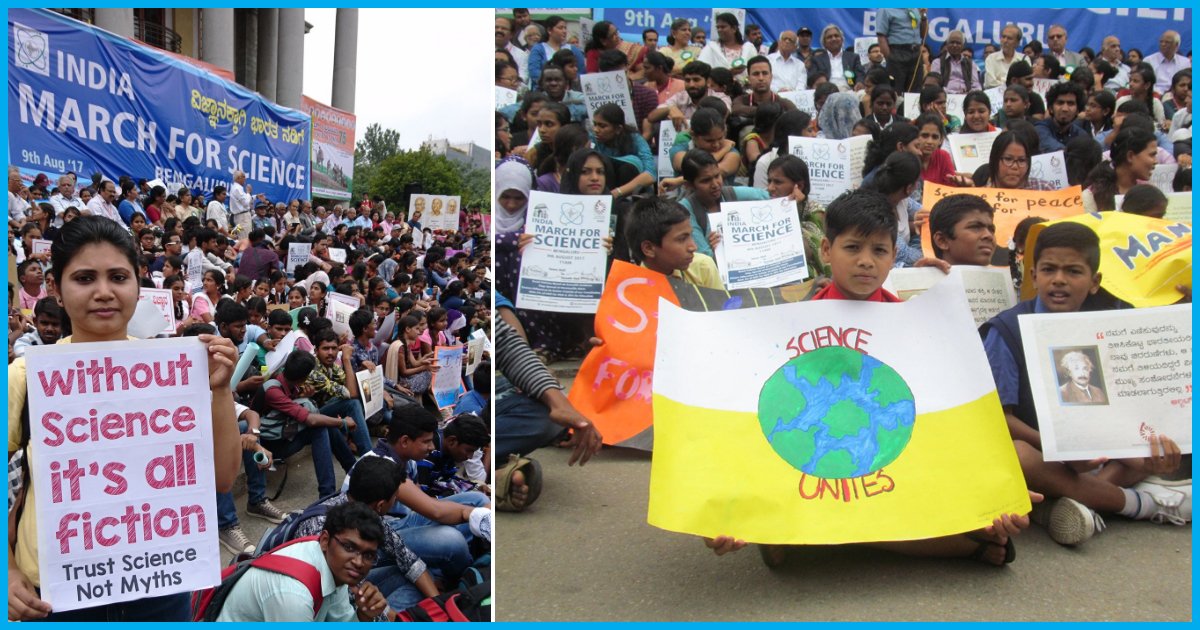
Thousands Take To The Streets To March For Science In 25 Cities Across India
10 Aug 2017 5:16 AM GMT
Editor : Sudhanva Shetty Shetty
Writer, coffee-addict, likes folk music & long walks in the rain. Firmly believes that there's nothing more important in a democracy than a well-informed electorate.
A group of scientists and academics across the country teamed up with concerned citizens to organise a national “March for Science” on August 9, 2017. The march was unique as India’s scientists took the protest route for probably the first time to highlight evidence-based policy making and the need to increase science funding and criticise pseudo-scientific/unscientific beliefs.
The group – Breakthrough Science Society – aimed to replicate the success of the Global March for Science, which took place on April 22 in 600 cities across the world, where over a million people demanded robust funding for science and demanded that governmental policies be guided by scientific evidence.
Why an all-India March for Science?
The Logical Indian spoke with Soumitro Banerjee, General Secretary of Breakthrough Science Society and Professor at the Department of Physical Sciences in the Indian Institute of Science Education and Research, Kolkata.
Professor Banerjee said, “On 22 April, when the world marched for science, the historic movement failed to make an impression in India. We missed the bus. But now, Indians who practice and support science and evidence-based beliefs have decided to take a stand. We need to voice our support for the funding and propagation of science and criticise irrational beliefs. This is an urgent need. Research institutions are extremely constrained, financially speaking. CSIR (India’s largest R&D organisation), in fact, has declared a financial emergency due to a complete lack of funds.”
The Professor continued, “There is also a propagation of unscientific views and beliefs. There seems to be a lack of money to spend on scientific research but there seems to be enough money to spend on researching cow urine and Rama Setu. This has fuelled a confrontational chauvinism in lieu of true patriotism that we cherish. Many organisations have come forward to support the March for Science and we are expecting a massive and successful movement.”
We need better funding for fundamental science. An appeal to government by Indian scientsts. #marchforscience pic.twitter.com/u9Yt0HLeSm
— Deepak Modi (@DeepakNModi) August 10, 2017
#marchforscience #india #delhi @IndSciComm pic.twitter.com/WlsRUeqD2L
— Rintu Kutum (@rintukutum) August 9, 2017
Worrying lack of research funding
Scientists said in their appeal to the country that, on the one hand, scientists from India have played a commendable role in the discovery of gravitational waves and of the Higgs Boson, in the interplanetary mission through Mangalyaan, and in reducing foreign dependence through the development of indigenous satellite launching capability.
But, on the other hand, science in India is facing the danger of being eclipsed by a rising wave of unscientific beliefs and religious bigotry, and scientific research is suffering a serious setback due to dwindling governmental support.
In fact, financial support to even premier institutions like IITs, NITs, and IISERs has been slashed. Universities are facing a shortage of funds to adequately support scientific research. Research funding agencies like DST, DBT and CSIR are reportedly impacted by reduced governmental support. Scientists in government laboratories are being asked to generate a part of their salary by selling their inventions and from other sources.
“Although the government expects us to achieve groundbreaking discoveries, it fails to realise that the basic necessity is infrastructure, which requires sufficient funding,” Anindita Brahma, a research associate at the Indian Institute of Science, told Al Jazeera after attending the march in Bengaluru.
We checked out the #marchforscience at #elliotsbeach in #chennai and was very pleased to see awareness being raised for #Women in #Stem pic.twitter.com/bInReRfXZO
— InnerGoddess Academy (@the__iga) August 10, 2017
These kids have the right messages on their posters! #marchforscience #Bengaluru pic.twitter.com/563z0lsa2p
— IndSciComm (@IndSciComm) August 9, 2017
#marchforscience Mumbai. pic.twitter.com/CNORib0xaq
— Aniket Sule (@aniket_sule) August 10, 2017
Scientists appeal, “We feel that the situation demands the members of scientific community to stand in defence of science and scientific attitude in an open and visible manner as done by scientists and science enthusiasts worldwide … We appeal to scientists, researchers, teachers, students, as well as all concerned citizens to organise ‘India March for Science’ events throughout the country, particularly in the state capitals, on 9th August 2017.”
March for Science’s demands
The participants of India’s March for Science will put forth four main demands to the government and to society as a whole:
- Allocate at least 3% of GDP to scientific and technological research and 10% towards education
- Stop propagation of unscientific, obscurantist ideas and religious intolerance, and develop scientific temper, human values, and spirit of inquiry in conformance with Article 51A of the Constitution.
- Ensure that the education system imparts only ideas that are supported by scientific evidence.
- Enact policies based on evidence-based science.
“The march is not a protest,” Meena Kharamtal, one of the organisers of the rally in Mumbai told Al Jazeera. “This is a march for science,” she said.
To know more about March for Science, visit their official website here.
To know more about India’s record on science spending, click here.
 All section
All section













